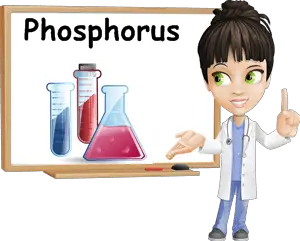Although not as popular as calcium or potassium, phosphorus is a dietary mineral of crucial importance for good health. It is the second most abundant mineral in the human body and ensures strong teeth and bones. Cell membranes, RNA and DNA all contain phosphorus. In addition to this, it is an important component of nervous tissue, supporting the nervous system health and cognitive functions. Brittle bones, tooth decay, impaired growth, rickets, joint pain, muscle weakness and anemia are common phosphorus deficiency symptoms.
The dietary mineral works together with calcium, magnesium and vitamin D to ensure bone health. As a general rule, animal products rich in calcium contain generous amounts of phosphorus as well. Also, the best dietary sources of phosphorus are high-protein foods such as fish and other meats, dairy and milk. It also reunites with B vitamins to support nerve health, hence its part in the prevention of muscle spasms, tingling and numbness in arms and legs, irregular heartbeat in the form of extrasystoles and breathing difficulties.

About phosphorus deficiency
Although exposure to high amounts of phosphorus can easily result in toxicity, a moderate intake is necessary for staying in good health. The most common two phosphorus deficiency symptoms are brittle bones and joint pain occurring in various parts of the body. Tooth decay, rickets and other bone-related health issues my also occur as a result of a deficiency, although they may be attributed to other deficiencies or medical conditions as well. Alcoholism, anorexia and malnutrition, diabetes, kidney problems and several less common genetic disorders can contribute to phosphorus deficiency.
How much phosphorus a day?
The recommended minimum daily intake of the mineral is of about 700 mg a day for the average adult. Nursing mothers may have higher requirements of up to 1,250 mg of phosphorus a day, but it is important to consult a doctor on the matter before pursuing any action. A varied, balanced diet should meet most, if not all of our phosphorus requirements. Too much phosphorus from either food or dietary supplements can be detrimental to human health and even cause toxicity, which is why it is recommended to avoid having a higher than than the recommended daily minimum.
What are the functions of phosphorus?
The most significant 7 health benefits and functions of phosphorus include:
- Maintaining strong, healthy bones and teeth.
- Improved digestion.
- Plays a role in protein formation from amino acids.
- Contributes to maintaining hormonal balance.
- Plays a role in energy production via carbohydrate and fat synthesis.
- Sustains cell repair processes.
- Helps maintain normal blood pH.
- Plays a role in basic chemical reactions within the body.

Phosphorus in the body
A diet rich in both phosphorus and calcium can easily provide support for the bone frame and prevent numerous health problems related to weak, brittle bones such as osteopenia and osteoporosis. An interesting symptom illustrative of phosphorus deficiency is loss of appetite, but nonetheless remains vague and can hint at a variety of other causes. In case of a more severe deficiency, anxiety, tremors, weight loss and impaired growth may occur.
Phosphorus toxicity, characterized by overexposure to the mineral, can be lethal, but an intake high enough to produce such effects is not normally a result of dietary intake. Therefore eating phosphorus-rich foods is both safe and recommended for keeping healthy. Exceeding the recommended intake is not.
Other noticeable signs of phosphorus deficiency are arthritis and joint pain, numbness in arms and legs, extrasystoles, abnormal heart beats, difficulty in remembering things. Note: extrasystoles can be defined as a harmless medical condition characterized by an extra heart beat occurring prematurely in between two regular beats.
Find out more about extrasystoles and the heart.
Phosphorus metabolism is supported by an adequate calcium and vitamin D intake, both of which are famous for promoting the formation of a strong, healthy bone frame and work closely with phosphorus. For example, vitamin D directly regulates both phosphorus and calcium metabolism and, in the case of an insufficient intake of calcium, it signals the kidneys to stop excreting calcium and draws it into the blood from the bones in the form of calcium phosphate.
Moreover, as a mineral of dietary importance, it strengthens cell membranes, supports the synthesis of other nutrients, maintains hormonal balance and takes part in a variety of chemical processes at cell level. Just as important, it is essential for the formation of healthy nervous tissue and cells and supports the good functioning of the entire nervous system. In addition to this, phosphorus helps synthesize fats, proteins and carbohydrates from food, meaning it helps absorb nutrients from the food we eat, for the purpose of energy production. Last but not least, it promotes cell repair.
Phosphorus absorption rate
The phosphorus in animal-based foods is more bioavailable than the one in plant-based foods, meaning we absorb more of the first. Plant sources of the mineral such as beans, peanuts, almonds, cereals or grains have it in the form of phytic acid, which is not just poorly absorbed, but downright unavailable for absorption to humans. Moreover, phytic acid is an antinutrient, meaning it reduces the absorption of other nutrients as well by binding to them. The absorption of iron in particular, but also of calcium and zinc is affected (reduced) by phytic acid in plant foods such as nuts, seeds, cereals and the flours made from them. Beef, poultry, dairy, milk, eggs and fish such as salmon are better sources because their phosphorus is more bioavailable.
Conclusion
As you can see, phosphorus is essential for good health. It is best to supply our body with the necessary amounts by means of a healthy, varied diet, but make sure we don’t exceed our daily requirements. Fish and sunflower seeds are both excellent sources of the mineral and so are meat and eggs, milk, dairy products, even whole grains and beans, with the mention that we are more likely to absorb the phosphorus is animal food sources better than the one in plant food sources.
